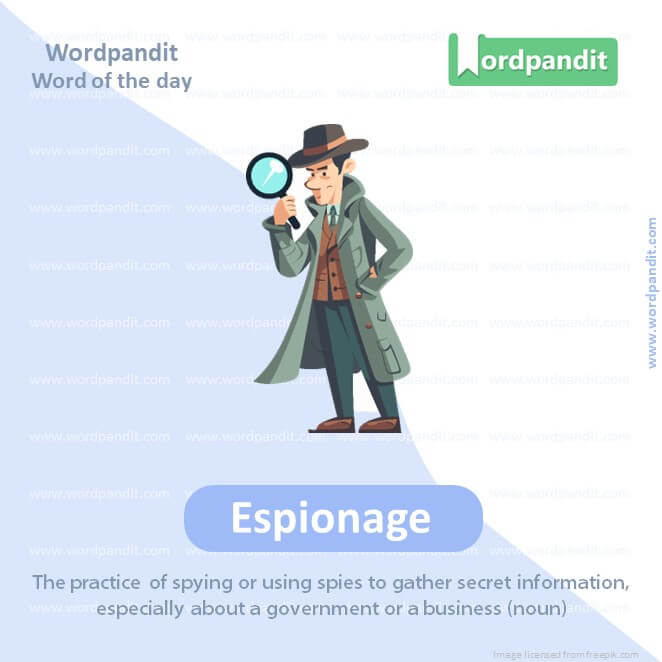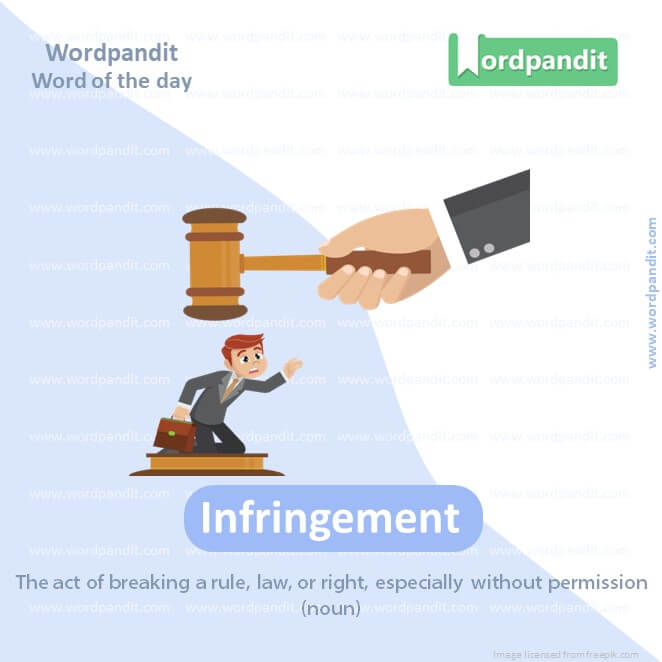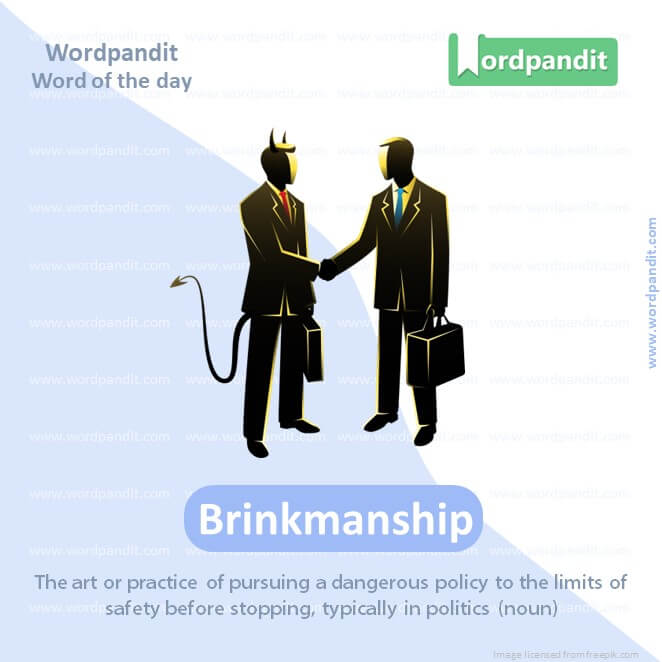Daily Vocabulary Words: List of Daily Used Words in Leading International Newspapers
Hi there. Welcome to this special section @ Wordpandit.
Our endeavour here is very simple: to highlight important daily vocabulary words, which you would come across in leading newspapers in the country. We have included the following newspapers in our selection:
• The New York Times
• The Washington Post
• Scientific American
• BBC
• The Guardian
• Psychology Today
• Wall Street Journal
• The Economist
We are putting in extensive work for developing your vocabulary. All you have got to do is be regular with this section and check out this post on a daily basis. This is your repository of words that are commonly used and essentially, we are posting a list of daily used words. Hence, this has significant practical application as it teaches you words that are used commonly in leading publications mentioned above.
Visit the website daily to learn words from leading international newspapers.

WORD-1: Extradite
CONTEXT: The Julian Assange farce has run its time. He should be left to return to his homeland of Australia. Yet another appeal against successive British court decisions to extradite him to the US has been allowed. It merely prolongs the tedium.
SOURCE: The Guardian
EXPLANATORY PARAGRAPH: Imagine if you took your friend’s toy and went to your house with it, your friend’s mom might ask your mom to send you back with the toy to return it. “Extradite” is like that, but for grown-ups. It means sending someone back to the place where they are supposed to be, especially to face consequences of something wrong they did.
MEANING: The act of sending someone back to the country or state where they allegedly committed a crime (verb).
PRONUNCIATION: EK-struh-dyte
SYNONYMS: deport, hand over, deliver, surrender, repatriate
USAGE EXAMPLE:
1. The court decided to extradite the criminal back to his home country for trial.
2. There was a discussion on whether to extradite the businessman accused of fraud.
3. Officials agreed to extradite the fugitive who had escaped across the border.
4. The government was hesitant to extradite the suspect without solid evidence.
WORD-2: Prolongs
CONTEXT: The Julian Assange farce has run its time. He should be left to return to his homeland of Australia. Yet another appeal against successive British court decisions to extradite him to the US has been allowed. It merely prolongs the tedium.
SOURCE: The Guardian
EXPLANATORY PARAGRAPH: Think about when you’re playing your favorite game and you don’t want to stop, so you keep finding ways to make the game last longer. “Prolongs” means making something last more time than it was supposed to.
MEANING: To make something last for a longer time (verb).
PRONUNCIATION: proh-LAWNGZ
SYNONYMS: extend, lengthen, stretch out, continue, perpetuate
USAGE EXAMPLE:
1. She prolongs the meeting by asking many questions.
2. He found a way to prolong the life of his phone battery.
3. The play was prolonged due to the enthusiastic response from the audience.
4. The discussion was prolonged by unexpected disagreements.

WORD-3: Tedium
CONTEXT: The Julian Assange farce has run its time. He should be left to return to his homeland of Australia. Yet another appeal against successive British court decisions to extradite him to the US has been allowed. It merely prolongs the tedium.
SOURCE: The Guardian
EXPLANATORY PARAGRAPH: Think of sitting and watching paint dry or having nothing fun to do for a very long time. “Tedium” is when something is so boring and slow that you wish you could be doing anything else.
MEANING: The state of being tediously long or dull (noun).
PRONUNCIATION: TEE-dee-uhm
SYNONYMS: boredom, monotony, dullness, weariness, drudgery
USAGE EXAMPLE:
1. The lecture filled him with tedium.
2. She tried to find ways to break the tedium of her daily routine.
3. The long drive was a tedium he did not enjoy.
4. He found the tedium of the task almost unbearable.

WORD-4: Espionage
CONTEXT: Like many freelancers in the undergrowth of espionage, Assange is no knight in shining armour. Phone hacking is an infringement of privacy to which he first pleaded guilty in 1996 in Australia. He then graduated to state secrets.
SOURCE: The Guardian
EXPLANATORY PARAGRAPH: Imagine you have a secret clubhouse where you keep your secret toys, and someone sneaks in to see what toys you have and tell others. “Espionage” is when someone secretly finds out information that is not supposed to be known by others.
MEANING: The practice of spying or using spies to gather secret information,
especially about a government or a business (noun).
PRONUNCIATION: ES-pee-uh-nahzh
SYNONYMS: spying, surveillance, reconnaissance, intelligence, infiltration
USAGE EXAMPLE:
1. The novel is about espionage during the Cold War.
2. He was charged with espionage for leaking secret documents.
3. The agency is involved in global espionage activities.
4. Espionage can involve high-tech gadgets like in the movies.

WORD-5: Infringement
CONTEXT: Like many freelancers in the undergrowth of espionage, Assange is no knight in shining armour. Phone hacking is an infringement of privacy to which he first pleaded guilty in 1996 in Australia. He then graduated to state secrets.
SOURCE: The Guardian
EXPLANATORY PARAGRAPH: Imagine if you built a cool block tower and someone else came and started changing it without asking you. “Infringement” is when someone does something that breaks the rules set on what they can or cannot do, especially with things that belong to someone else.
MEANING: The act of breaking a rule, law, or right, especially without permission
(noun).
PRONUNCIATION: in-FRINGE-muhnt
SYNONYMS: breach, violation, encroachment, intrusion, infraction
USAGE EXAMPLE:
1. He filed a lawsuit for the infringement of his copyright.
2. The company was accused of patent infringement.
3. They discussed how to handle the infringement of privacy issues.
4. An infringement notice was issued for unauthorized use of the software.
WORD-6: Ominous
CONTEXT: A number of statements from US officials over the past three months have been raising ominous warnings about a Russian plan to put an alarming new weapon into space. As a Department of Defense spokesperson put it to Vox directly in a conversation last week, “The United States assesses that Russia is developing a new satellite carrying a nuclear device.”
SOURCE: Vox
EXPLANATORY PARAGRAPH: Think about a dark, cloudy day when it feels like a big storm is coming. That kind of day feels “ominous,” like something bad or scary might happen soon.
MEANING: Giving the impression that something bad is going to happen (adjective).
PRONUNCIATION: OM-uh-nuhs
SYNONYMS: threatening, menacing, foreboding, sinister, portentous
USAGE EXAMPLE:
1. The dark clouds were an ominous sign of the coming storm.
2. There was an ominous silence in the room after the argument.
3. The news had an ominous tone, which worried everyone.
4. The creaking sounds from the old house were ominous at night.
WORD-7: Detonation
CONTEXT: Don’t get too relaxed, though: The Pentagon spokesperson stressed that a nuclear detonation in space would be “catastrophic” and “pose a threat to the thousands of satellites operated by countries and companies around the globe, as well as to the vital communications, scientific, meteorological, agricultural, commercial, and national security services we all depend upon.” It would also mark a major step toward the militarization of space and potentially a new and even more dangerous era of nuclear brinkmanship.
SOURCE: Vox
EXPLANATORY PARAGRAPH: Imagine a big firework going off with a loud “BOOM.” That loud sound and explosion is called a “detonation.” It’s what happens when something explodes or bursts with a lot of noise.
MEANING: The act of exploding or causing something to explode (noun).
PRONUNCIATION: det-uh-NAY-shun
SYNONYMS: explosion, blast, burst, blowup, discharge
USAGE EXAMPLE:
1. The detonation of the bomb was heard from miles away.
2. They used a controlled detonation to demolish the old building.
3. The experiment involved a small detonation in a secure facility.
4. There was a loud detonation when the fireworks started.

WORD-8: Brinkmanship
CONTEXT: Don’t get too relaxed, though: The Pentagon spokesperson stressed that a nuclear detonation in space would be “catastrophic” and “pose a threat to the thousands of satellites operated by countries and companies around the globe, as well as to the vital communications, scientific, meteorological, agricultural, commercial, and national security services we all depend upon.” It would also mark a major step toward the militarization of space and potentially a new and even more dangerous era of nuclear brinkmanship.
SOURCE: Vox
EXPLANATORY PARAGRAPH: Imagine you and a friend are seeing who can swing the highest without jumping off. You’re both trying to show you’re the bravest without getting hurt. “Brinkmanship” is when countries or leaders try to show they are strong and brave by getting very close to danger but without actually starting a big problem.
MEANING: The art or practice of pursuing a dangerous policy to the limits of safety before stopping, typically in politics (noun).
PRONUNCIATION: BRINK-muhn-ship
SYNONYMS: maneuvering, tactics, diplomacy, strategy, negotiation
USAGE EXAMPLE:
1. The politician’s approach to the crisis was described as brinkmanship.
2. Brinkmanship during the negotiations kept everyone tense.
3. The leaders engaged in brinkmanship, each not wanting to back down.
4. His style of brinkmanship often led to successful but risky outcomes.
WORD-9: Cryptic
CONTEXT: It first became a news story on February 14 when Rep. Mike Turner (R-OH) posted a cryptic statement on Twitter saying that the House Intelligence Committee, which he chairs, had become aware of a “serious national security threat” and calling on President Biden to declassify all information about it
SOURCE: Vox
EXPLANATORY PARAGRAPH: Imagine a treasure map with weird pictures and symbols that are hard to understand. “Cryptic” is when something is written or said in a way that is confusing and hard to figure out, like a secret code.
MEANING: Being mysterious or obscure in meaning (adjective).
PRONUNCIATION: KRIP-tik
SYNONYMS: enigmatic, mysterious, obscure, puzzling, ambiguous
USAGE EXAMPLE:
1. The message was cryptic and hard to understand.
2. He left a cryptic note that made her curious.
3. The clues were cryptic and required some thinking to solve.
4. His reasons for leaving were cryptic and not fully explained.
WORD-10: Wayside
CONTEXT: Unfortunately, at precisely the moment when the nuclear standoff is extending all the way to the heavens, Cold War-era arms control treaties of all types are falling by the wayside.
SOURCE: Vox
EXPLANATORY PARAGRAPH: Imagine walking on a path and there’s an area beside it where things like benches or flowers might be. “Wayside” is a term used to describe the side of a road or path, especially where things might be placed or where people might stop.
MEANING: The edge or side of a road or path (noun).
PRONUNCIATION: WAY-syd
SYNONYMS: roadside, edge, verge, periphery, shoulder
USAGE EXAMPLE:
1. The car pulled over to the wayside to let the ambulance pass.
2. Flowers were planted along the wayside.
3. They stopped at a small cafe by the wayside.
4. Litter along the wayside was cleaned up during the community service day.
Vocabulary Definition
Understanding a language requires a deep grasp of the ‘vocabulary definition’. These precise meanings of words shape our understanding and communication. However, to successfully learn ‘vocabulary definition’, one must do more than just memorize a dictionary. So what’s the perfect approach to assimilating ‘vocabulary definition’?
The compelling answer is context. To truly comprehend ‘vocabulary definition’, expose yourself to diverse reading materials such as books, magazines, newspapers, and digital content. This approach equips you with a practical understanding of ‘vocabulary definition’ and illuminates the nuanced ways in which they get employed in conversation and writing.
An innovative way to enhance memory while learning ‘vocabulary definition’ involves visualization. By creating a mental image representing the definition, your brain can help cement the association between the word and its meaning, improving recall capability significantly.
Now, understanding and retaining ‘vocabulary definition’ is only one part of the equation. The other, equally essential part is application. Actively using these words in your personal conversations, professional communication, or social media posts will reinforce your understanding and usage of ‘vocabulary definition’.
Interactive language tools can be a great help when mastering ‘vocabulary definition’. Language-learning software and applications often provide comprehensive word definitions, examples, and even quizzes to test your learning progress.
In conclusion, the journey of embracing ‘vocabulary definition’ demands a blended approach. Diversified reading materials, visualization techniques, active application, and the leverage of modern language-learning tools together chart a pathway to mastering ‘vocabulary definition’. Remember, every word definition you conquer is a stepping stone leading you to the magnificent mansion of language proficiency. Happy learning!













